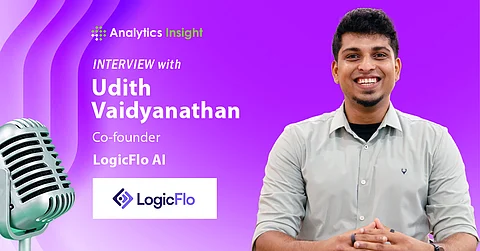

The Life sciences industry is entering a new era where speed, accuracy, and compliance are critical for innovation. In the latest episode of the Analytics Insight podcast, host Priya Dialani speaks with Udith Vaidyanathan, Co-Founder of LogicFlo AI, to explore how AI is transforming the life sciences industry. Accelerating drug discovery, commercialization, and medical workflows while maintaining strict regulatory standards is a must now.
As the sector faces mounting pressure to innovate responsibly, the conversation highlights how AI agents are reshaping workflows, enhancing human expertise, and enabling faster, safer, and more efficient scientific and commercial outcomes.
LogicFlo AI focuses on enabling post-development workflows, including commercialization, medical affairs, and regulatory operations. “We provide configurable AI agents that help teams fast-track their work with higher quality, compliance, and speed,” Mr. Udith shares.
Unlike automation for automation’s sake, their approach centers on augmenting human decision-making while reducing administrative burdens for scientists and healthcare professionals.
Mr. Udith highlights three common misconceptions. First, AI does not replace experts; it complements their judgment.
Second, fine-tuning models is insufficient - success requires domain, process, and individual workflow understanding.
Third, AI adoption is not purely technical; it’s fundamentally a trust and workflow decision. “In regulated sectors like pharma, automation without oversight isn’t speed - it’s risk,” he emphasizes, drawing an analogy to aviation where pilots remain essential despite autopilot technology.
Regulation and ethics are central to LogicFlo AI’s philosophy. “We don’t view regulation as a constraint. We view it as a design input,” Udith Vaidyanathan explains. Every output is reviewable, reference-backed, and version-controlled, ensuring human decision-making remains central.
Addressing bias and inclusion in datasets, the company prioritizes fairness, transparency, and explainability to mitigate risks to underrepresented populations.
Looking ahead, Udith envisions a future where AI moves from point solutions to cognitive infrastructure. Teams of AI agents can execute complex scientific tasks under expert supervision, reducing document cycles from weeks to mere minutes while maintaining full compliance.
“This creates an AI-native operating layer, fundamentally changing how work gets done,” he states.
Udith Vaidyanathan advises aspiring tech and life sciences leaders to embrace human-centered AI, prioritize compliance by design, and focus on building trust and precision.
In his view, the ultimate goal is not to replace human judgment but to enhance it - creating smarter, faster, and more ethical workflows that benefit patients, scientists, and the industry alike.
